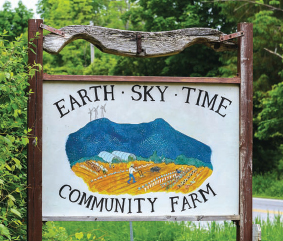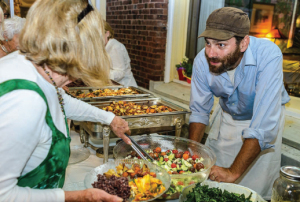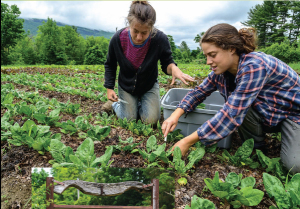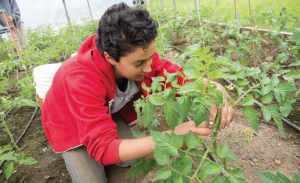Remember last winter?
“I loved the winter, personally.”
Skiers and snowboarders would have an easy time agreeing with Oliver Levis of Earth Sky Time Community Farm in Manchester when it came to an assessment of the chillier-than-new-normal winter of 2013-14. Others, recalling the lingering cold weather that extended well into April, might have had an easier time keeping their enthusiasm in check.
Levis likes to snowboard too, but what helps make the winter months a productive and enjoyable time is the start of the long journey being made by the vegetables that will eventually populate the tables at local farmers markets later in the year. Far from being a barren, empty time on the farmer’s calendar, there’s a lot going on inside the four greenhouses that dot a field to one side of the house where he lives with friends and family.
Spinach, kale, lettuce and arugula survive all through the winter, he says during a stroll through one of the greenhouses this gray day in early April.
 “All these things will grow right through the winter, but they’re not going to really germinate so well, so we transplant them,” he says. “September, October, November is when you plant all that stuff, and harvest all winter long. Things can freeze, and they’ll thaw, and as long as it’s sunny and they’re not frozen when you harvest them, it doesn’t matter that they’ve frozen if you select the right varieties. We’re just happy to be growing things in the winter and bringing them to market. And it’s really satisfying.”
“All these things will grow right through the winter, but they’re not going to really germinate so well, so we transplant them,” he says. “September, October, November is when you plant all that stuff, and harvest all winter long. Things can freeze, and they’ll thaw, and as long as it’s sunny and they’re not frozen when you harvest them, it doesn’t matter that they’ve frozen if you select the right varieties. We’re just happy to be growing things in the winter and bringing them to market. And it’s really satisfying.”
By mid-March, the onions, peppers and tomatoes will be added to the greenhouse roster, and by the end of April—weather permitting—they’ll be transplanted outside, to be joined later by potatoes, garlic and squash. By then the farmers market season is in full swing, with Manchester, Dorset, Londonderry and Ludlow all hosting sites for local farmers to sell their produce directly to customers. And Earth Sky Time will have the inventory ready, Levis says.
At some point in the future, historians may look back on 2013-14 when food awareness and interest in eating food that was locally grown and fresh, much of it organically, hit some kind of tipping point. The state legislature passed a groundbreaking GMO (genetically modified organisms) labeling statute. Farmers markets are burgeoning. And buying locally made bread or produce is easier than ever.
The long road to the farmers markets, or the community supported agriculture (CSA) farm stand he and his communal team of family members and interns run at Earth Sky Time on Route 7A south of Manchester, or the farm nights at the Wilburton Inn in Manchester Village he and his family hosts, began at the Victorianesque house where an old apple orchard still stands. Base camp for Earth Sky Time is the house Levis grew up in.
He graduated from Burr and Burton Academy in 1996 after an unhappy stint at a boarding school and got more interested in farming that year than in going on to college.
“I just wanted to homestead here on this piece of land,” he says, referring to the 13 acres the family owned on one side of Ormsby Hill. “I raised a few hundred chickens that summer and kind of sold them to my mom’s friends.”
Eventually, he made his way to the University of Vermont, where he studied agriculture, then Cornell University in Ithaca, NY. By then he had a strong sense he wanted to do something with farming and food, but lacked a clear vision of what that would be, he says.
That goal took an unlikely twist when he moved back, not to Vermont, but to New York City, where his family is originally from. He eventually became the superintendent of the apartment building he lived in, where he learned how to fix things—a handy skill for a farmer to have, he says. He and his wife Bonnie moved back to Manchester in the early 2000s when his parents, Albert and Georgette Levis, who owned and ran the Wilburton Inn on River Road in Manchester Village, acquired a neighboring property occupied by the former Olde English Inn. They wanted to convert it into a retreat and center—eventually renamed Teleion Holon—for those in search of a place for spiritual and creative re-energizing. For a while Oliver and Bonnie helped run it, with its yoga classes and other holistic programs. But they also planted vegetables and sold them at the Manchester Farmers Market. They found themselves enjoying that more than running a retreat. Up went the first greenhouses, and in came the first batch of young farming interns, eager to learn more about agriculture and growing crops. In 2009, they traded places with Oliver’s parents, moving back to the family homestead at Earth Sky Time (the name derives from Ancient Greek mythology—Gaia, the primal Greek mother earth goddess, gave birth to both land and sea gods from her unions with Uranus, the sky god, and Pontus, the father of several water gods).
The following year they decided to go into the bread business as well and add that to the CSA business they were already deeply involved with. The premise of Earth Sky Time’s CSA is simple and straightforward: sixty or so customers prepay at the start of a growing season for a weekly share of vegetables for 20 weeks. Based on a point system, customers pick and choose what they want that given week. In 2010, their customers started getting the option of a loaf of bread along with their other vegetables.
“It was really low-key,” Oliver said. “But it struck a chord and I was interested in it.”
The following year they bought a bread oven, he said. Not just any oven—a Spanish-made, wood burning Llopis oven that was shipped from Barcelona in pieces and reassembled by a team of experts when it arrived in Manchester. The oven’s rotating hearth measures 11 and a half feet in diameter and weighs about 20 tons. It churns through two cords of pine wood a month while maintaining a constant temperature of 500 degrees Fahrenheit.
They bake four times a week and produce about 2,000 loaves of all kinds of bread—ranging from sliced “Stevie Wonder” bread to hearty multigrain sourdough rye. They bake up to 3,000 loaves a week in the summer.
“I never would have thought I was going to be a baker but personally, I’m interested in the process,” Oliver says. “You have this product that starts as dried flour and you turn it into beautiful breads.”
Bonnie Levis was a schoolteacher from Queens, NY before coming to Vermont with Oliver to run Teleion Holon.
“I used to think I worked pretty hard when I taught pre-kindergarten during the day and went to graduate school at night,” she says with a laugh. “But that’s nothing to having three kids and running three businesses.”
Along with growing vegetables and the bakery comes the commercial kitchen, Bonnie’s main domain. She oversees the prep work for the Farm Nights at the Wilburton Inn Earth Sky Time puts together every Wednesday night during the summers, along with preparing their Veggie Burgers and hoomoos—their take on Middle Eastern chickpea spread— and other products bearing the farm’s label.
“It takes a lot of energy to run the kind of ship we run, because it’s sort of a motley crew,” she says. “Everyone becomes part of the family. It’s not like people work a certain number of hours and then go home—home is here.”
And it is, literally. A group of farm interns who live and work with them in a communal setting in exchange for learning farming and baking skills do a lot of the hard work, Bonnie and Oliver say. There are usually about 10 at any one time. Some are so-called “wwoofers”—short for “worldwide opportunities on organic farms.” It’s an education and cultural exchange program where volunteers come to live and work at an organic farm like Earth Sky Time in return for learning the trade. Others arrive through word-of-mouth, or drawn by the farm’s website. Not everyone is accepted, and at this point it’s not unusual to turn prospects away, especially if their main goal is a short 3-4 week stint in the summer before moving on to something else. A longer term commitment is sought. Interviews used to be fairly casual. Now they are more formal and sometimes conducted over Skype.
“My biggest question is do you smoke—anything,” Bonnie said. That’s a no-no.
“We’re not looking for people who think it’s a party,” she added. “There’s been a huge increase in the number of people who want to do what we’re doing…. It’s varied, it’s not just vegetables. We’re deeply involved in the community through farmers markets and CSA.”

It’s an intensely communal lifestyle, almost a throwback to an earlier era before living separately as nuclear families became more or less the norm, and both Oliver and Bonnie enjoy it.
“It’s something that people are not generally used to,” Bonnie says. “There’s an element of people taking care of each other and people finding out what they are good at.”
One of the interns who got her start in small scale organic agriculture back in the early days is Nicole Henry, who worked with Oliver and Bonnie when they were starting out at the former Olde English Inn. Since then she’s managed by turns the Dorset Farmers Market, the Manchester Farmers Market and the West River Farmers Market in Londonderry. She was a “wwoofer” who had just graduated from the Massachusetts College of Liberal Arts in North Adams, MA, when she connected with Bonnie and Oliver through friends of her parents, she said.
“Getting out of college I wanted to start with something that was positive right from the get-go,” she says.
“We are feeding our community and having fun,” Levis says. “We are bringing cool people to Manchester and sharing our knowledge. It’s all part of the vision.”
By the following year she was managing both the Manchester and Londonderry farmers markets and learning about what makes the economics of organic farming go. Her arrival coincided with the blossoming of interest in healthy foods, the growth in the number of farmers markets and a rise in the number of certified, organically farmed acres.
The number of farmers markets in Vermont has nearly doubled over the past 10 years, from 40 to nearly 80, Henry says, which makes Vermont the state with the most number of farmers markets per capita.
“Which is kind of cool,” she says while checking in a customer at the Dorset Farmers Market at the JK Adams kitchenware store early one Sunday morning last winter. “If a customer has a problem, they can come right back here and deal directly with a vendor.”
Meanwhile, the total number of certified organic farming acres grew from a little under 16,000 in 1999 to almost 104,000 in 2013, according to the Northeast Organic Farming Association of Vermont, better known as NOFA-VT. Founded in 1973, it’s one of the oldest farming organizations in the country.
To put that in perspective, about 10 percent of Vermont’s approximately 1.2 million acres of agricultural land is being cultivated organically.
While the increase in the number of acres under cultivation that are organically certified has slowed in recent years after a breakneck pace set in the first decade of the 21st century, there’s a real value for farmers to endure the rigorous steps required to obtain the organic certification, says Nicole Dehne, the certification administrator for NOFA-VT.
“It becomes a real benefit for folks that are selling wholesale,” she says. “When you are getting to a size where your customer isn’t necessarily going to know the specifics of your farming operation, the (certification) logo allows them to understand something about your farm immediately.”
To qualify, farmers have to keep detailed—some call them burdensome— records for three years while their acreage transitions from commercial fertilizer to organic materials like manure. Just because a farm grows vegetables “locally” doesn’t mean they are also “organic.”
“I think what a lot of people think of when they think of organic is the absence of certain things, like pesticides or synthetic fertilizers,” she says. “I like to remind consumers that … the foundation of organic farming is more about building healthy soil so you don’t have to use those materials
A good business plan is essential, because organic cultivation alone is no guarantee of success and sustainability. You have to know what you’re doing, watch costs and mange cash flow. And NOFA wants to help. They will review the requirements with farmers and explain the hurdles so there are no surprises. Most who undertake the effort make it through, and find the detailed record keeping becomes an asset in helping them manage their business, she says.
Vermont has a 10-year strategic food plan known as the Farm to Plate Investment Program. It was launched in 2009 by the state legislature and designed to increase economic development in Vermont’s food and farm cluster, create jobs in the agricultural sector and improve access to healthy locally grown foods.
The other goal is to push Vermonter’s consumption of locally grown foods from 5 percent of all we eat—which is already one of the highest in the nation—to 10 percent by 2020, says Liz Ruffa of Northshire Grows, one of the roughly 300 local groups sprouting up around the state to make it easier and in the long run, less expensive, for the state’s residents to buy local while eating healthier food.
Her aim is to strengthen the network of growers and food producers that already exists in Bennington County and integrate them more closely together.
“There’s a buoyant economy around food,” she says. “Oliver Levis is a great example of someone who bakes fantastic bread, but maybe he’d like to open up to, say, Saratoga NY as a market. If he knew of someone like Peter Sharp of Morgan Hill Farm who drives over there three times a week with his pork, that would make his life easier.”
If by 2020, 10 percent of all food consumed in the state came from local sources, it will happen through the work of groups like Northshire Grows and their success, says Rachel Carter, the communications director for the Vermont Sustainable Jobs Fund, which serves as the farm to plate network’s coordinator. Getting to the goal involves more than price competitiveness; it’s also about perception.
“If there’s a little bit more consumer behavior change—looking at labels more, focusing more on that which is grown locally or in New England— that money circulates in the local economy and that’s what sends the message to farmers to produce more,” she says. “We want to get more local food into independent grocery stores to see if it could be profitable for them to sell more.”
One way Oliver and Bonnie Levis, along with the rest of their family is probably helping that perception process along is through their very successful “Farm Nights” at the Wilburton Inn. For the past four years during the summers, every Wednesday night, Earth Sky Time hosts a dinner at the Inn, with food they’ve prepared and grown. For $20, dinner guests get to tuck into an organic vegetarian feast, with live music on the side, out on the terrace of the inn, which looks out over the valley dividing the Green Mountains and the Taconics. They typically serve somewhere between 80 to 100 dinners a night.
“Every night is different,” says Melissa Levis, one of Oliver’s sisters who recently returned to Vermont to help run the inn. “Oliver is very well known in this town. It’s definitely been very successful and a great collaboration.”
So successful, in fact, the Inn added a Thursday night tapas bar with food supplied from Earth Sky Time this year.
But it’s a lot of work too. They cook all the food at the farm, and it’s different every week, depending on what’s in season or what they feel inspired to do, Oliver says.
“It’s gotten to the point where we have to do the prep work a day ahead—cooking for 80 people means you have to chop a lot of veggies,” he says.
Fortunately, there are a lot of veggies available to chop. Back inside the greenhouse, where the nascent plants are starting to pop out of their containers, Oliver anticipates another strong growing season, ready to supply the farmers markets, the CSA customers, the Farm Nights, along with the growing bread business. He’s also thinking ahead, to acquiring more land, and maybe reviving the apple orchard that used to be here. And there’s a bigger picture to consider.
“We are feeding our community and having fun,” he says. “We are bringing cool people to Manchester and sharing our knowledge. It’s all part of the vision.” ◊
Andrew McKeever is a freelance writer from Shaftsbury.



